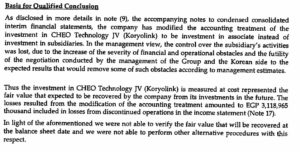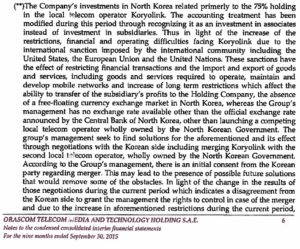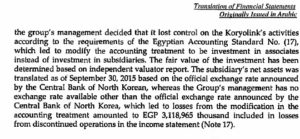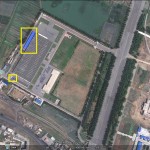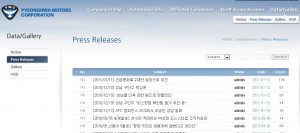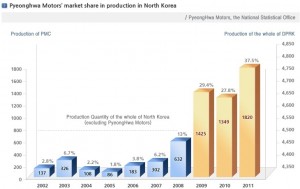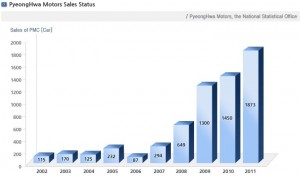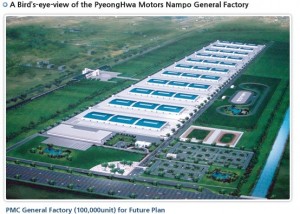When North Korea’s late “Dear Leader” Kim Jong Il opened the Pothonggang Department Store in December 2010, he called on it to play “a big role” in improving living standards in the capital Pyongyang, official media said.
Five years later, judging by the long lines inside the three-storey store that sells everything from electronic gadgets and cosmetics, to food and household goods, the Pothonggang is meeting Kim’s expectations – at least for privileged Pyongyang residents.
But the department store also starkly illustrates the extent to which the underground market has become the new normal in isolated North Korea. And that poses a dilemma to the Kim family’s hereditary dictatorship, which up until now has kept tight control of a Soviet-style command economy, largely synonymous with rationing and material deprivation. Now that the black market has become the new normal, Kim Jong Un’s government has little choice but to continue its fledgling efforts at economic reforms that reflect market realities on the ground or risk losing its grip on power, experts say.
A Reuters reporter, allowed to roam the store with a government minder for a look at the North Korean consumer in action, noted almost all the price tags were in dollars as well as won. A Sharp TV was priced at 11.26 million won or $1,340; a water pump at 2.52 million won ($300). Beef was 76,000 won ($8.60) a kilogramme. North Korean-made LED light bulbs sold for 42,000 won ($5). The exchange rate used in these prices – 8,400 won to the dollar – is 80 times higher than the official rate of 105 won to the dollar. At the official rate, the TV would cost over $100,000; the light bulb, $400.
Shoppers openly slapped down large stacks of U.S. dollars at the cashier’s counter. They received change in dollars, Chinese yuan or North Korean won – at the black market rate. The same was true elsewhere in the capital: taxi drivers offered change for fares at black market rates, as did other shops and street stalls that Reuters visited.
For the last twenty years, North Korea has been undergoing economic changes, the fruits of which are now more visible than ever in the capital, Pyongyang, where large North Korean companies now produce a diverse range of domestically made goods to cater to this growing market of consumers. People are spending money they once hid in their homes on mobile phones, electric bicycles and baby carriers.
The latest sign that the workers’ paradise is going capitalist: cash cards from commercial banks.
GREW OUT OF FAMINE
Four months before Kim opened the Pothonggang Department Store, the United States imposed sanctions on North Korea, including its imports of luxury goods, for torpedoing a South Korean ship – a conclusion Pyongyang rejected. Since then, the U.N. has imposed more sanctions on North Korea for violating restrictions on its nuclear and missile programmes.
None of that has had much effect on the vast majority of North Koreans living in the countryside, where a rudimentary market has evolved considerably over the past two decades. Agricultural mismanagement, floods and the collapse of the Soviet Union led to famine in the mid-1990s. The state rationing system crumbled, forcing millions of North Koreans to make whatever they could to sell or barter informally for survival.
The regime penalised this new class of entrepreneurs in 2009 when it redenominated the won by lopping off two zeros and setting limits on the quantity of old won that could be exchanged for the new currency. That move ended up destroying much of the private wealth earned on the market.
Demand for hard currency surged after the bungled currency reform as more and more merchants in the underground markets required transactions to be conducted in foreign currency. It triggered two years of hyperinflation.
But the government of Kim Jong Un, who became North Korea’s leader after his father’s death in December 2011, has essentially accepted the ubiquity of the black market rate and a widespread illicit economy, North Korea experts say.
“Under Kim Jong Un, not a single policy has been implemented which would somehow damage the interests and efficiency of private businesses,” said Andrei Lankov, a North Korea expert at Kookmin University in Seoul.
“It’s a good time to be rich in North Korea”.
THE NEW CONSUMER
Many of the goods inside the Pothonggang Department Store, a grey building nestled between willow trees and a river of the same name, are still beyond the reach of many North Koreans.
An air conditioning unit sells for 3.78 million won ($450 dollars) – which if paid in won would require a bag of 756 five thousand won notes, the highest denomination note in won.
A growing middle class called “donju”, meaning “masters of money”, who made cash in the unofficial economy are starting to spend it on these new products, along with the long established elite of Humvee-owning individuals with powerful political connections.
Only recently an elite item, mobile phones are now common in the capital, with nationwide subscriber numbers topping three million, an employee with Koryolink, the cellular carrier controlled by Egypt’s Orascom Telecom told Reuters.
The number has tripled since 2012 and indicates one in eight of North Korea’s 24 million people now have a mobile phone.
Energy-saving products are a fast-growing sector of North Korea’s new consumer market and were one of the hottest items in the department store.
Domestically produced LED bulbs are ubiquitous in North Korea, where satellite images have shown a country almost completely black at night. The 9-watt bulb costs $5 and is a best-seller at the Pothonggang store, said a staff member. The energy-saving bulbs are used inside homes and on street lamps that now bask the formerly darkened streets of the Pyongyang night in a dull, faint glow.
Solar panels with USB-enabled inverters and batteries are available in the store alongside water pumps and small generators – exactly the kind of systems North Koreans now use to take power into their own hands.
CASH CARDS
Baby products are another booming consumer item. A large section of the department store is devoted to strollers and baby carriers produced in China and South Korea.
Many residents of Pyongyang can be seen riding Chinese-made battery powered bicycles, which only began to appear in the capital over the last year, locals said.
Some of these transactions are done with the Narae Card, a cash card run by North Korea’s Foreign Trade Bank – a designated entity under U.S. sanctions since 2013 for the part it reportedly played in nuclear weapons procurement.
Cash cards have been in the hands of the few for the last several years but have recently become a new growth industry. Narae cards are topped up with U.S. dollars and are mainly used for foreign currency purchases. They can also be used to top up mobile phone accounts.
Foreign investors can also set up banks in North Korea and are allowed to lend money and provide credit-based financing schemes to North Korean companies, according to a bilingual book of North Korean law available to foreign investors.
Ryugyong Commercial Bank, for instance, offers shopping discounts as well as gold or silver card options for its customers. As with the Narae card, customers are encouraged to top up their accounts with dollars.
LOSING FACE?
After a $4 dollar taxi ride, the driver reluctantly handed the change from a twenty dollar note to a Reuters correspondent who insisted on getting change in North Korean won.
Foreigners are not officially permitted to use the currency, so the openness of the transaction – in the presence of a government guide – was another sign of the black market turning white in north Korea. The driver’s reluctance to hand over won was because of its inconvenience, not because he was afraid of being caught.
“It’s a lot of notes in our money,” he grumbled, counting out 130,000 won from a large crumpled bundle of discoloured 5000 won notes.
That note, still the highest denomination, once carried a smiling portrait of founding president Kim Il Sung but is being gradually phased out by a version with no portrait – an indication a larger denomination note may one day replace it to accommodate the widespread use of black market pricing.
That would also get around the embarrassing problem that the faces of American and Chinese leaders, not the Kims, adorn much of the cash used in the country now. For a regime that has cultivated a personality cult around the Kim dynasty, it is quite literally losing face on its own money.
MATTER OF TIME
Where there’s commercial enterprise, advertising is sure to follow. Sprinkled in among the roadside signs and billboards, once the exclusive domain for propaganda, are small notices that tout car repair services, electronics and trading companies
One prominent company, Naegohyang [Naekohyang/내고향] (my homeland) advertises at football games and has a women’s football team by the same name. It produces everything from clothes and sanitary pads to 7.27 brand cigarettes, a favourite of Kim Jong Un’s who can be seen smoking them on state TV. They also make ‘Achim’ cigarettes for export to Iran with printed health warnings written in Farsi.
At a speech following a military parade marking the 70th anniversary of the ruling Workers Party, Kim Jong Un promised to introduce “people-first” politics. It remains unclear, however, how committed he and his Workers Party – not to mention the powerful military – are to market-based reforms.
But it’s only a matter of time before the Kim regime formally adopts a market-based economy – as China did 35 years ago under Deng Xiaoping, said Kookmin University’s Lankov, who lived in Pyonyang in the 1980s.
“That’ll be a great day, but it’ll be relatively meaningless in one regard,” he said. “It’ll be a formal recognition of something which has happened anyway”.

